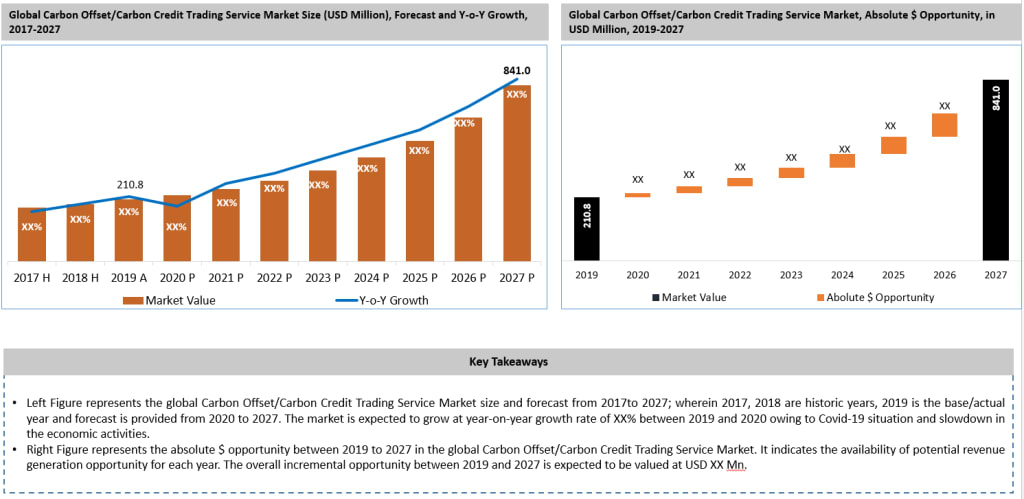Carbon Offset/Carbon Credit Trading Service Market - GrowthMarketReports
Carbon Offset/Carbon Credit Trading Service Market

The global carbon offset/carbon credit trading service market was valued at USD 210.8 Million in 2019 and is projected to reach USD 841.0 Million by 2027, expanding at a CAGR of over 19.9% during the forecast period. A carbon offset is a calculable avoidance, sequestration or lessening of carbon dioxide (CO2), and other Green House Gas (GHG) releases. Carbon offsets are defined as project-based as they normally comprise specific projects or events that decrease or evade or appropriate emissions. Investments in carbon-offset projects, individuals can fund GHG-reduction processes applied by individuals to decrease their carbon tax legal responsibility, which costs lesser than what could be accomplished through investment in a company's operations.
Carbon offset/carbon credits are marketplace structures for the reduction of greenhouse gases emission. The greenhouse gas emissions limits are set by governments or regulatory agencies. Some companies cannot achieve an immediate reduction in emissions economically. Consequently, the companies can buy carbon credits to comply with the emission cap. Companies with carbon offsets (greenhouse gas (GHG) emissions reductions) are generally rewarded with additional carbon credits. The selling of credit surpluses can be used to subsidize potential pollution reduction programs.
For Free Exclusive Sample Report @ Carbon Offset/Carbon Credit Trading Service Market
The developing countries present in regions including Asia Pacific, Latin America, Africa, and others are undergoing rapid industrialization and simultaneously accounting for higher carbon emission. With the emergence of new methods such as carbon offset/carbon credit trading services, the governments and other organizations operating across these regions are coming up with new rules and regulations to overcome the environmental hazards and counter the carbon emission.
Carbon offset projects are evaluated and developed under particular standards and approaches that allow carbon credits to be supplied. Liability on the type of procedures used for the improvement of carbon credits, can also be traded in voluntary markets of carbon credit. Offset projects can be classified rendering to either the technology engaged or type of GHG saving, or the specific practice selected to develop the project. The four most corporate categories of offset projects are renewable energy, biological sequestration, energy efficiency, and reduction of non-CO2 GHG emissions. Carbon offset practice describes factors and procedures required for calculating emission reductions by a carbon offset project during its lifespan. Project developers can use prevailing methods or develop new ones. Carbon offset practices have to be accepted by a regulatory body assigned with the management of a particular standard. This certifies that all carbon offset projects globally are established under the same practice.
The two types of credits are:
Voluntary emissions reduction (VER): A carbon offset that is traded in the over-the-counter or voluntary market for credits.
Certified emissions reduction (CER): Emission units (or credits) created through a regulatory framework with the purpose of offsetting a project's emissions.
The key difference between the two is that, as opposed to the VER, there is a third-party certifying authority that regulates the CER.
Europe dominates the global carbon market, as the companies emit greenhouse gases under the European Union Emission Trading Scheme (EU ETS) are compelled to reduce their greenhouse releases or purchase pollution allowances or carbon credits from the market. The market in Europe is projected to hold a major market share during the forecast period, as the volatile carbon prices in Europe is increasing the demand for carbon credit trading services. The global leading polluters such as the US and China are yet to establish compulsory policies to reduce emissions.
Regional Outlook
In terms of regions, the global carbon offset/carbon credit trading service market has been fragmented into North America, Europe, Asia Pacific, Latin America, and Middle East & Africa. Europe constituted significant share of the market in 2020. The market in Asia Pacific is projected to expand at a considerable CAGR during the forecast period.
Competitive Landscape
The global carbon offset/carbon credit trading service market is dominated by key players such as Carbon Credit Capital, Terrapass, Schneider Electric, 3Degrees, NativeEnergy, GreenTrees, South Pole Group, Aera Group, Allcot Group, Carbon Clear, Forest Carbon, Bioassets, Biofílica WayCarbon, CBEEX, and Guangzhou Greenstone.
About Growth Market Reports:
GMR provides global enterprises as well as medium and small businesses with unmatched quality of “Market Research Reports” and “Industry Intelligence Solutions”. GMR has a targeted view to provide business insights and consulting to assist its clients to make strategic business decisions and achieve sustainable growth in their respective market domain. Our key analysis segments, though not restricted to the same, include market entry strategies, market size estimations, market trend analysis, market opportunity analysis, market threat analysis, market growth/fall forecasting, primary interviews, secondary research & consumer surveys.
Contact:
Growth Market Reports
Phone: +1 909 414 1393
Email: [email protected]
Web: https://growthmarketreports.com
Follow Us: LinkedIn | Twitter






Comments
There are no comments for this story
Be the first to respond and start the conversation.